WHAT
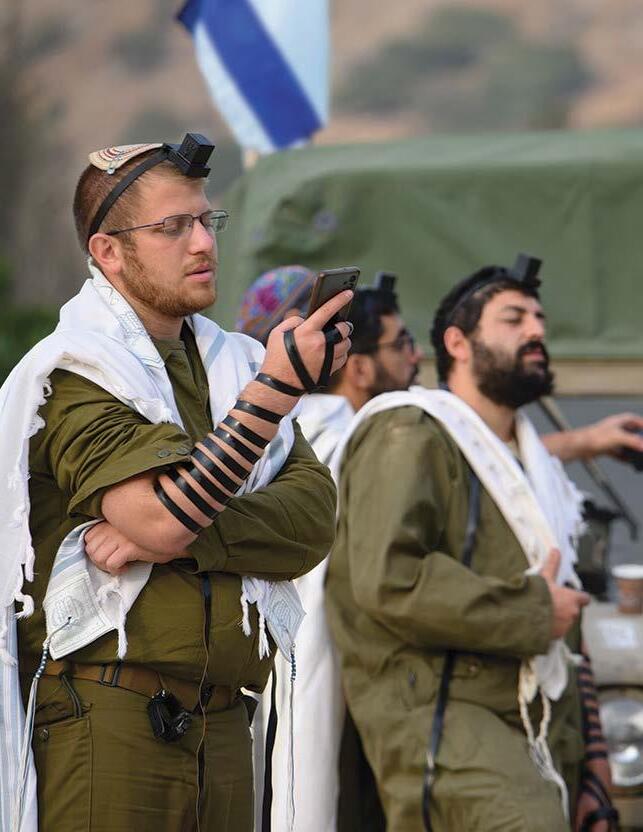
THE YEAR OF THE WATCHMEN
•••
PASSOVER TEACHES US ABOUT JESUS (PAGES 8–10) •••
INTERNATIONAL CHRISTIAN EMBASSY JERUSALEM // MARCH 2024 // USA EDITION
WORD FROM JERUSALEM
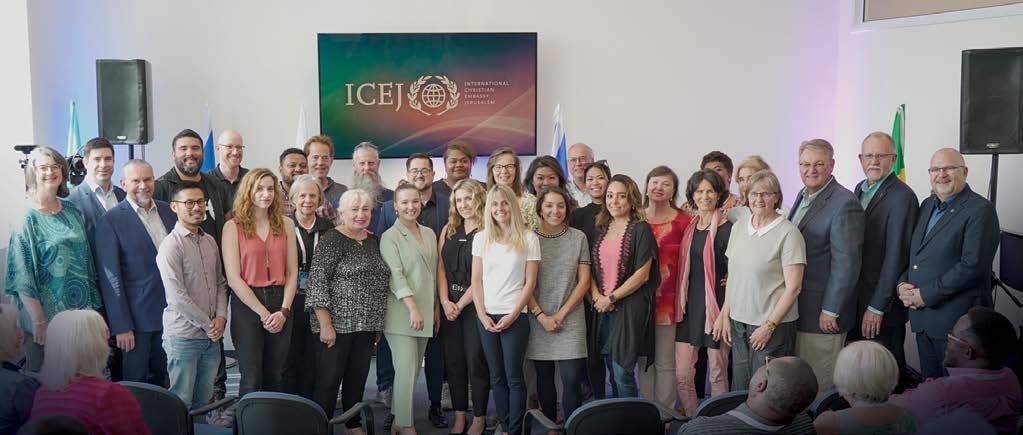

The International Christian Embassy Jerusalem was established in1980 in recognition of the biblical significance of all of Jerusalem and its unique connection to the Jewish people. Today the ICEJ represents millions of Christians, churches, and denominations to the nation and people of Israel. We recognize in the restoration of Israel the faithfulness of God to keep His ancient covenant with the Jewish people. Our main objectives are:
• To stand with Israel in support and friendship
• To equip and teach the worldwide church regarding God’s purposes with Israel and the nations of the Middle East
• To be an active voice of reconciliation between Jews, Christians, and Arabs, and to support the churches and congregations in the Holy Land
From its head offices in Jerusalem, the ICEJ reaches out into more than 170 countries worldwide, with branch offices in over 90 nations.
Our vision is:
• To reach every segment of Israel’s society with a Christian testimony of comfort and love
• To reach and actively represent to Israel the support of denominations, churches, and believers from every nation on Earth
The Christian Embassy is a non-denominational faith-based ministry supported by the voluntary contributions of our partners and friends across the globe. We invite you to join with us as we minister to Israel and the Jewish people worldwide by donating to the ongoing work and witness of the ICEJ.
CREDITS
ICEJ President Dr. Juergen Buehler
USA Director Susan Michael
VP International Affairs Dr. Mojmir Kallus
VP Finance David van der Walt
VP Operations Barry R. Denison
VP International Spokesman David Parsons
VP AID & Aliyah Nicole Yoder
Managing Editor/Publications Director Laurina Driesse
USA Managing Editor Karen Engle
Staff Writer Anastasiya Gooding
Graphic Design/Illustrators Ryan Tsuen, Peter Ecenroad, Nancy Schimp
Photography Bill Fairs on Unsplash, Shutterstock,iStock, Adobe Stock, AP, AFP, JAFI, Flash90, Haaretz, Reuters, IDF, businessweek.com, Netafim, newatlas, SanDisk, Watergen, Waze, Wikimedia Commons, Levi Dörflinger, John Theodor, ICEJ Staff and Branches
The New King James Bible is used for all Bible references unless otherwise noted.
Word From Jerusalem is published by the International Christian Embassy Jerusalem. Reproduction in whole or in part without written permission is prohibited. Word From Jerusalem has no subscription price and is supported through contributions worldwide. The ICEJ USA Branch is a 501(c)(3) non-profit organization with offices in Tennessee, Florida, and Washington, DC. All gifts to this ministry are tax-deductible according to United States law.
INTERNATIONAL CHRISTIAN EMBASSY JERUSALEM - USA
Support our ministry online at: www.icejusa.org
FROM THE PRESIDENT'S DESK

Dear friends,
Allow me to be forthright about the current situation here in Israel. First, this is a time of war—but not a war between radical Islam and the free Western world only. This war has another dimension that the Bible identifies as a struggle against the spirit of Amalek. A wicked spirit of antisemitism—the most ancient hatred known to man—is cruelly targeting the Jewish State and the Jewish people. As people of faith, we must take a clear stand against it.
This battle is being fought in the natural by the Israel Defense Forces (IDF). But it has a spiritual dimension, too, like when Moses, Aaron, and Hur stood on the mountain with arms lifted to heaven while Joshua led the fight on the battlefield against Amalek. Yes, Israel needs our prayer support—perhaps more than ever before. But it’s also a time for action. Right now, more than 200,000 Israeli evacuees are living in hotels, hostels, and guest houses around the country. There are still not enough helmets and bulletproof vests. People urgently need trauma treatment. The needs are endless, and Israel needs to see that there are Christians around the world who are standing with them but also responding in meaningful, material ways.
We must also speak up for Israel in our own countries like never before. It is unacceptable that in many Christian countries, more Muslims are demonstrating against Israel in the streets than Christians standing up for the Jewish State. We must mobilize our churches to action to show this embattled nation there are millions of believers standing with them worldwide.
Finally, it is a time for moral clarity. Isaiah 5:20 says, “Woe to those who call evil good, and good evil; who put darkness for light, and light for darkness.” Dear friends, this is happening right now around the world. South Africa’s request that the International Court of Justice find Israel guilty of committing genocide instead of Hamas and the United Nations’ voting record against Israel—proving it is an antisemitic organization— are just two of many examples of calling evil good and good evil.
Many of you have already answered the call to stand by Israel in all these ways. May you persevere as the battle continues. Or perhaps you sense God’s nudge to start doing more for Israel. The ICEJ invites you to join us in making a difference in Israel’s time of crisis. You can give at www.icejusa.com/crisis, but also join us for our daily prayer gatherings and updates at www.icejusa.org/GlobalPrayer.
Blessings from Jerusalem,

Dr. Juergen Buehler
President
International Christian Embassy Jerusalem
COVER PHOTO: IDF soldiers praying near Israel’s norther border (Flash90)
FOR MAGAZINE ARCHIVES visit www.icejusa.org/wfj

••• WHAT PASSOVER TEACHES US ABOUT JESUS (PAGES 4–6) WORD FROM JERUSALEM INTERNATIONAL CHRISTIAN EMBASSY JERUSALEM // MARCH 2024 // USA EDITION THE YEAR OF THE WATCHMEN
WORD FROM JERUSALEM
4
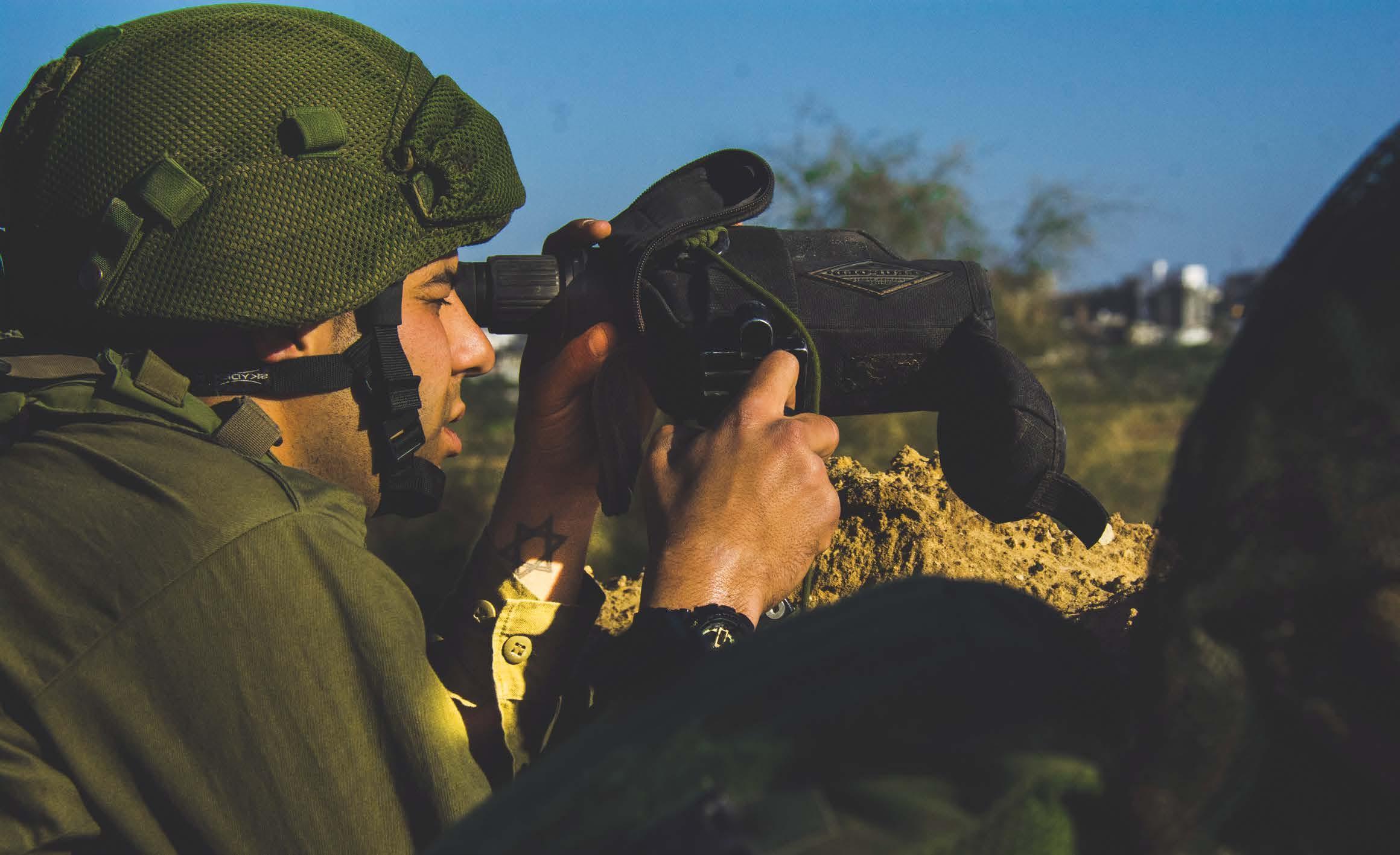

WHAT
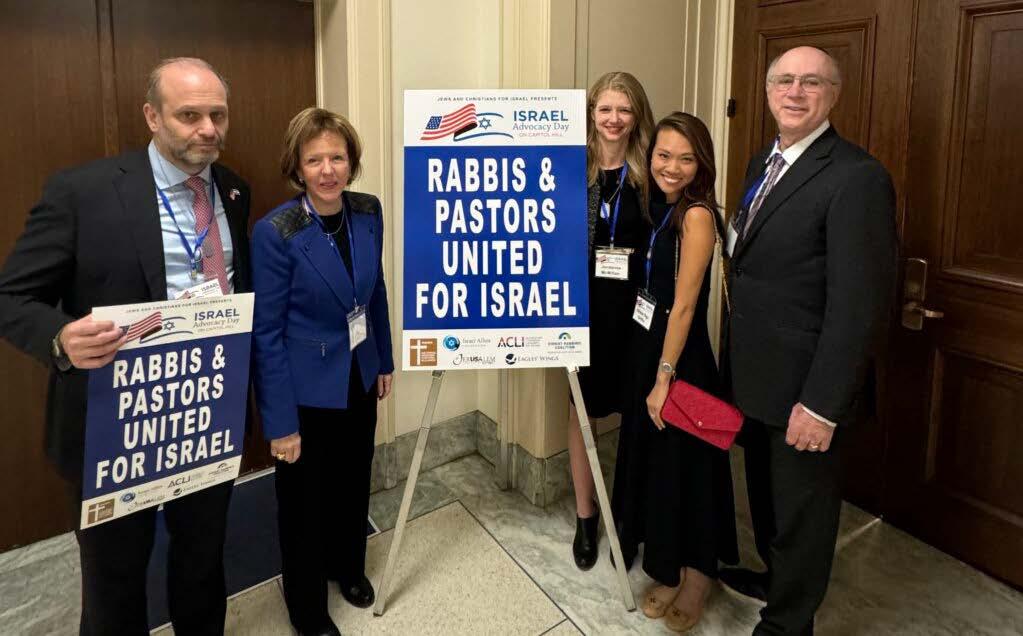
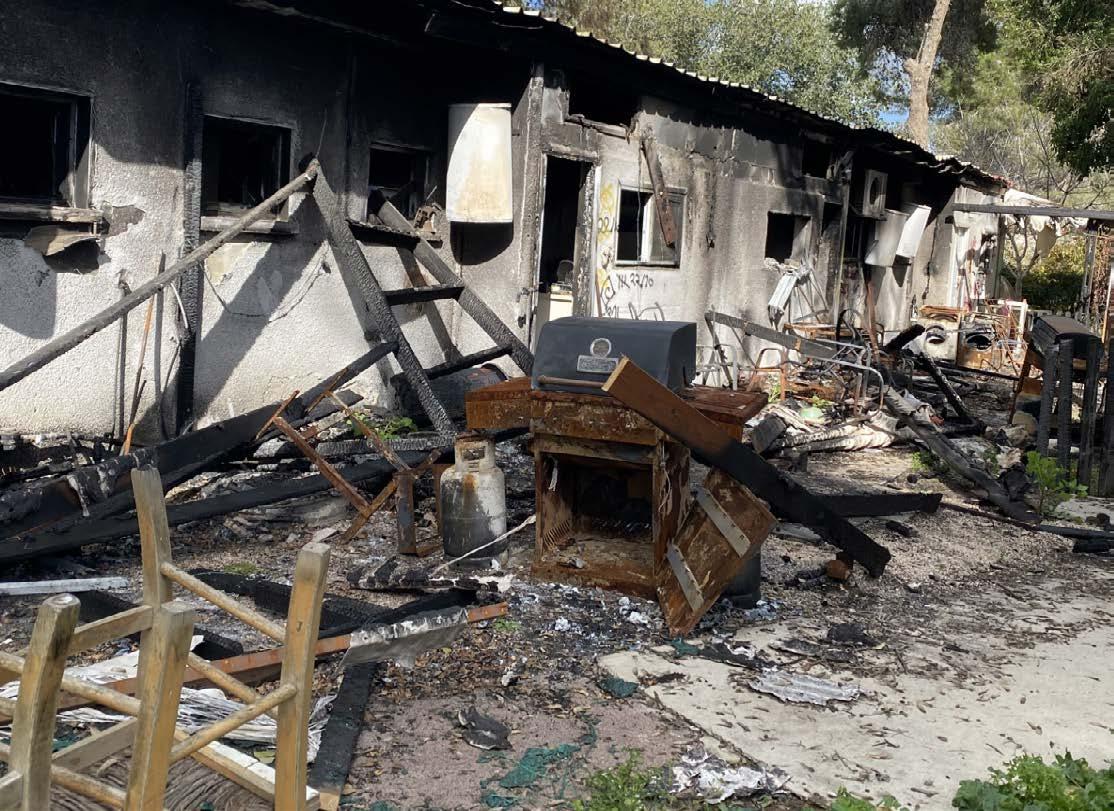
12 WHEN WORDS ARE NOT ENOUGH
15
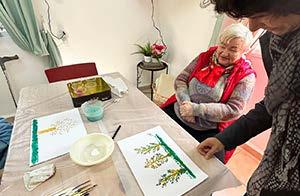
THE YEAR OF THE WATCHMEN
PASSOVER TEACHES US ABOUT JESUS 8
KEEPING HOLOCAUST SURVIVORS’ STORIES ALIVE
4 13 MARCH 2024 USA EDITION FEATURED TEACHING
PASTORS, RABBIS, AND LEADERS UNITE TO STAND FOR ISRAEL
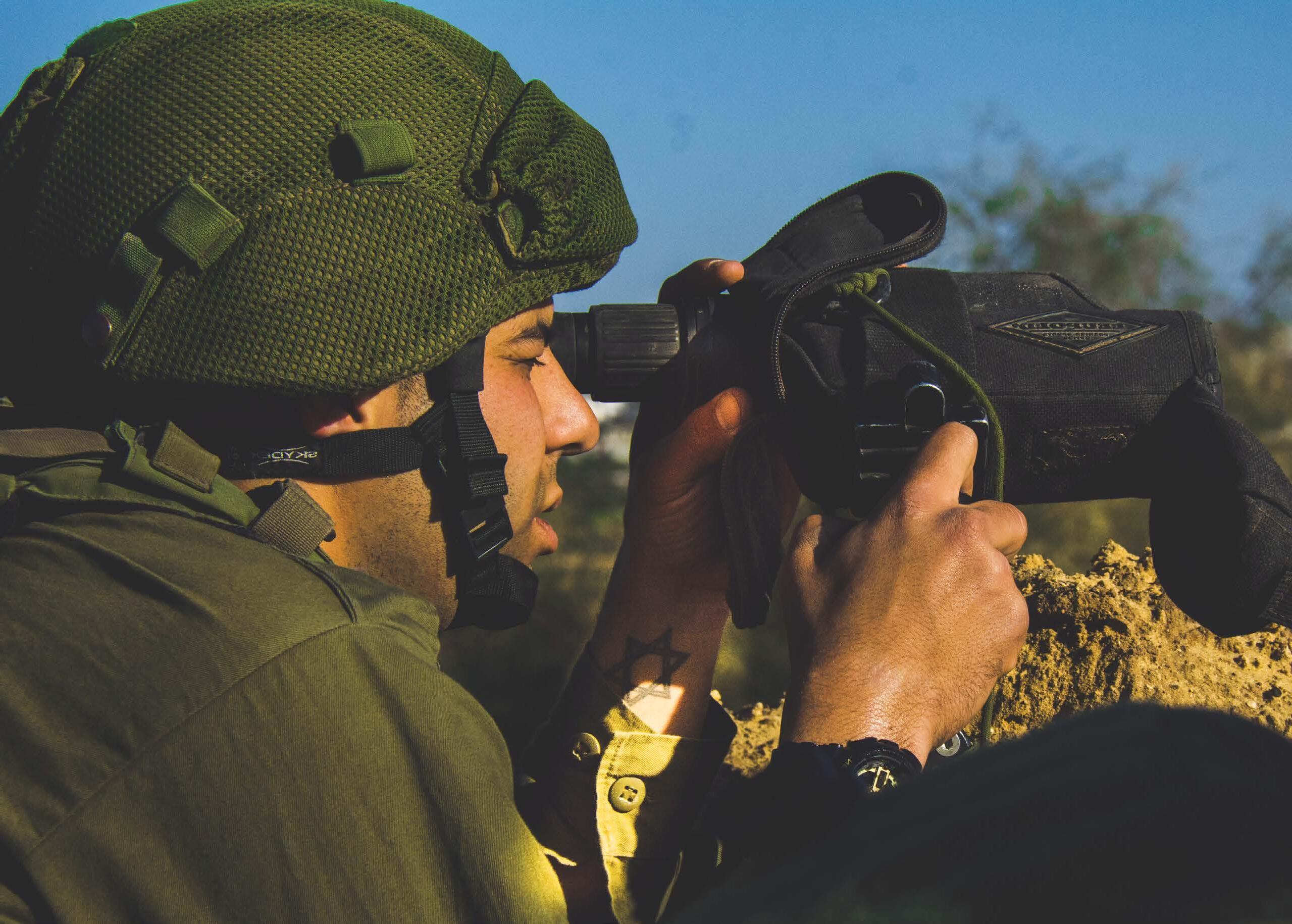
The horrific events of October 7 will be the subject of multiple investigations in Israel to determine what went wrong that fateful day. Already, many Israelis foresee numerous top political and military leaders being replaced. But one of the greatest failures is already known: the failure of the watchmen in Israel. To be more precise, military and intelligence officers higher up the chain failed to heed the warnings they had received from the watchmen.
In the weeks and even hours just before the attacks, multiple signs of an imminent attack
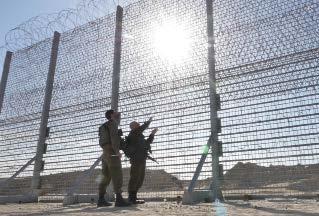
THE YEAR OF THE WATCHMEN
BY DR. JUERGEN BUEHLER, ICEJ PRESIDENT
Israel has always served as an example for the church, as Paul taught in 1 Corinthians 10:11.
were noted by observers who constantly watch countless security cameras along the Gaza border fence. But their warnings were dismissed. The prevailing assessment by senior officers was that Hamas would never dare try to breach the most secure border on Earth. The price of this flawed consensus was the brutally inhumane acts committed by Hamas terrorists and even Gazan civilians, which have cost Israel nearly 1,500 lives so far.
It was like the prophet of old warned: “Because they have seduced My people, saying, ‘Peace!’ when there is no peace” (Ezekiel 13:10). Or when Paul said: “For when they say, ‘Peace and safety!’ then sudden destruction comes upon them, as labor pains upon a pregnant woman. And they shall not escape” (1 Thessalonians 5:3).
Israel has always served as an example for the church, as Paul taught in 1 Corinthians 10:11. Indeed, recent events in Israel serve as sober, powerful lessons for the church and every individual believer today.
Many times in the Bible, we are told to be watchful. The watchman plays a central role in the Word of God. Jesus admonished Hisdisciples to “watch and pray” on the night He was betrayed (Matthew 26:41). The Hebrew
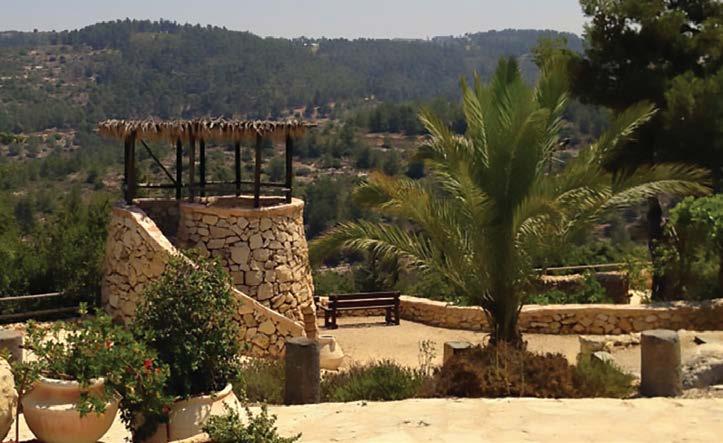
4 | MARCH 2024
ICEJ FEATURED TEACHING
Reconstructed watchtower in Moshav Yad Hashmona, Judean Hills (yad8.com)
Northern Gaza Regional Brigade soldiers scouting the Gaza border (IDF Flickr)

prophets saw themselves as watchmen for the nation (Ezekiel 3:17). In troublesome times, the prophet Habakkuk even decided to climb a watchtower to hear what the Lord would say to him (Habakkuk 2:1f).
Eerdmans Dictionary of the Bible describes a watchman as one whose duty it is to keep vigil, often on a tower or wall, whether for the king (1 Samuel 14:16), over a city (Song of Solomon 3:3), or over a field (Isaiah 56:9–10). They carry out their task often at night (Psalm

127:1). Paul even counsels the church at Ephesus to be watchful of “savage wolves” preying on the flock (Acts 20:28–32).
The events in Israel are a call to all believers to examine our own watchfulness and prayer habits. It is perilous that in many prosperous Western churches, the office of the watchman is neglected or nonexistent.
In Israel today, watchmen (shomrim in Hebrew) are part of daily life. They are at the entrances of communities, supermarkets, shopping malls, office buildings, and elsewhere. The more important the task, the younger and better trained they are. The watchmen
“Be sober, be vigilant; because your adversary the devil walks about like a roaring lion, seeking whom he may devour. Resist him, steadfast in the faith, knowing that the same sufferings are experienced by your brotherhood in the world.”
1 PETER 5:8–9
who guard the President’s House and Prime Minister’s Office are some of the best trained security forces in Israel, as these sites are under constant threat. Without these watchmen, more terror attacks would get through.
The Bible gives us four areas where watchmen are needed in the kingdom of God to stand guard over our personal or communal watchtower.
1. The Personal Watchmen
Everyone needs to be a watchman! A main characteristic of Israeli society is that virtually everyone has a duty as a watchman. A relatively high percentage of Israeli citizens carry a weapon, and many times these armed civilians are first on the scene of terrorist attacks and save lives.
The Bible calls on all of us to be watchful at all times: “Be sober, be vigilant; because your adversary the devil walks about like a roaring lion, seeking whom he may devour. Resist him, steadfast in the faith, knowing that the same sufferings are experienced by your brotherhood in the world” (1 Peter 5:8–9).
The believer is constantly surrounded by an enemy whose aim is to steal, kill, and destroy (John 10:10). Satan wants to destroy your family, your calling, and your walk with the Lord. It should make us think of so many prominent leaders in the church who, though pow-
erfully used by God, have come under attack and their ministries have fallen.
But it is not just the devil who can cause significant harm to God’s people; often it is the believer’s weakness. In his anguish at Gethsemane, Jesus warned His disciples: “Watch and pray, lest you enter into temptation. The spirit indeed is willing, but the flesh is weak” (Matthew 26:41). Jesus further taught that two things are needed to overcome fleshly desires: prayer and a state of spiritual alertness. Today, our fleshly desires are under assault more than ever as pornography and other perverted, sensual offerings are just a mouse click away.
One main reason for the lack of watchfulness among many believers is the great misconception that by joining the kingdom of God, we think we have joined a nice country club with wonderful people as members. The kingdom should be a place of righteousness, peace, and joy. But we also have joined an army in a state of war against Satan, and this war will only intensify as the Day of the Lord draws closer. That is why Paul addresses his disciple, Timothy, as a soldier who must follow strict military discipline (2 Timothy 2:3–4). Undoubtedly, we live in a time of increased spiritual conflict, and we do well to remain alert to our own weaknesses and any outside attack.
Now the most important question is what to do with the intelligence gathered as watchmen? It is one thing to see danger, but even more important is what to do in response. As I write this teaching, a security incident just happened in our village. A suspicious situation arose on our street that my dear wife, Vesna, noticed. She immediately contacted the head of security in our community. The matter was taken seriously and positively impacted security procedures in our village. That means, as believers, we take these matters to the head of our security, the captain of

5 |WORD FROM JERUSALEM
Israeli police officers stand guard in Jerusalem’s Old City (Israel Police Spokesperson)
“The Garden of Gethsemane” by Giorgio Vasari, c. 1570, oil on panel—National Museum of Western Art, Tokyo (Wikimedia)
ICEJ FEATURED TEACHING
our salvation—to Jesus—and let Him deal with it. That is why Jesus asked His disciples to watch and pray.
2. The Community Watchmen
My wife’s personal alertness also benefited the whole community. In the same way, we are called to be watchmen for those around us–our families, our brothers and sisters in the Lord, and even our nations. There is one area that the Word of God admonishes us to be especially watchful. Both Jesus and the apostles warned that deceptions would come in the last days. Easy doctrines may tickle our ears, but they have little sub-
We all need to watch ourselves and immerse daily in the Word of God and prayer.
stance. Leaders or elders in the work of God are especially called to be alert.
Again, Paul warned the church at Ephesus: “Therefore take heed to yourselves and to all the flock … For I know, that after my departure savage wolves will come in among you, not sparing the flock. Also from among yourselves men will rise up, speaking perverse things … Therefore watch” (Acts 20:28–31).
Paul also wrote to his understudy, Timothy: “Keep a close watch on yourself and on the teaching. Persist in this, for by so doing you will save both yourself and your hearers” (1 Timothy 4:16 ESV) This warning indicates not only that others can be wrong, but Paul said, “watch yourself.” Derek Prince once said Christians who believe they cannot be deceived are already deceived. We all need to watch ourselves and immerse daily in the Word of God and prayer.
The temple in Jerusalem had a special group of 4,000 Levites who served as “gatekeepers” (1 Chronicles 23:5). Their functions varied, as they guarded the ark of the covenant while on the move, the finances, or the entrance of the temple. Their work was an essential part of the House of God.
Today, we need the gift of discernment more than ever. We don’t need a physically strong bouncer to keep the wrong people from our services but people of spiritual discernment to keep the wrong worldly influences from impacting the church. The main purpose of the gatekeepers was not to create a cozy atmosphere for worship with the right people but

to assure that God’s glorious presence would be welcome in His own house. Rather than seeker-friendly churches, we need them to be God-friendly. For if His glory is there, the church will surely be a magnet for the lost.
3. The Prophetic Watchmen
The Hebrew prophets were called to be watchmen for Israel (Ezekiel 3:14). Their task was to keep watch over Israel’s spiritual condition. But they also served as watchmen on a national level, warning Israel at times of imminent danger and giving heavenly strategies to the king. They were God’s mouthpiece to the nation, identifying what needed to change, warning of threats, and clarifying the purposes of God in the near and distant future.
An important task of this office is to recognize the times and seasons in which we are living. The Bible applauds the tribe of Issachar as men “who had understanding of the times, to know what Israel ought to do” (1 Chronicles 12:32).
“I have set watchmen on your walls, O Jerusalem; They shall never hold their peace day or night. You who make mention of the Lord, do not keep silent, and give Him no rest till He establishes and till He makes Jerusalem a praise in the earth.”
ISAIAH 62:6–7
The body of Christ today needs believers like these men of Issachar. It requires more than just observing the cultural shifts in music or messaging to brighten our 90-minute Sunday service. Rather, there are seismic shifts taking place in the heavenly realm. Watchmen need to understand, like Daniel did, that our world is governed less by the leaders we vote into office and more by “principalities, against powers, against the rulers of the darkness of this age, against spiritual hosts of wickedness in the heavenly places” (Ephesians 6:12). This type of intelligence is gained in prayer and intercession and by the gifts of the Spirit.
There are great spiritual upheavals taking place in the Islamic world in our day. In recent decades, the number of Muslims finding Jesus as their redeemer is growing exponentially, yet we also are seeing an explosion of radical Islam manifesting not just in the Middle East but worldwide. Like in the time of Isaiah

(21:11ff), when people inquired about Dumah (today’s Arabian Peninsula), watchmen are needed to assess the times and to give insights and strategies for victory for the church.
Our societies face other unprecedented challenges, such as Artificial Intelligence and gender confusion. Yet the biggest change in the spiritual landscape is the restoration of Israel, which has massive implications for the church, especially as it will eventually bring the return of the Lord. However, this seems to be largely ignored by most churches today.
Habakkuk lived in a time of tremendous shakings, yet he made a strategic decision: “I will stand my watch and set myself on the rampart, and watch to see what He will say to me, and what I will answer when I am corrected” (Habakkuk 2:1).
This, more than ever, is a call to the body of Christ to man our watchtowers and see what the word of the Lord is for our time, so we can act like the sons of Issachar and pray strategically.
The place where watchfulness is most needed concerns the return of Jesus. More than in any other context, we are admonished to be watchful of His coming. The reason is simple. Jesus said that we will not know exactly when He is coming (Matthew 24:36, 39, 42, 44, 50). It will catch us by surprise, and the best way to be prepared is to be watchful. Spiritual drowsiness and living Christianity on autopilot is dangerous. What is available to help us drive our cars with ease does not work in the kingdom of God.
Therefore, Paul, writing to the church in Thessalonica, says: “For you yourselves know perfectly that the day of the Lord so comes as a thief in the night. For when they say, ‘Peace and safety!’ then sudden destruction comes upon them … Therefore let us not sleep, as others do, but let us watch and be sober” (1 Thessalonians 5:2–6).
Being alert means we invite afresh the Holy Spirit every day to speak to us, have a lifestyle of prayer, and study God’s Word. Exceptional times require exceptional measures.
6 | MARCH 2024
ICEJ FEATURED TEACHING
4. The Praying Watchmen
In the Bible, watchmen are often associated with prayer. The prayer movement of the ICEJ takes its inspiration from Isaiah 62:6–7: “I have set watchmen on your walls, O Jerusalem; they shall never hold their peace day or night. You who make mention of the Lord, do not keep silent, and give Him no rest till He establishes and till He makes Jerusalem a praise in the earth.”
The watchmen of Isaiah 62 serve two functions. They make their rounds day and night to constantly remind the community of its need for alertness. They know it would be wrong to assume a moment of safety for the city and people of God. Now, to assure this safety and destiny, they also “remind the Lord” of His promises to Israel. They pray unceasingly for the full restoration of Jerusalem until its ultimate destiny is reached. And Isaiah foresees a coming time when these dual tasks are completed.
In a way, these watchmen look out for imminent and future threats, but they also look beyond to the heavenlies to the promises of God that still await fulfillment and pray as long as it takes to see them come to pass.
Thus, watching and praying always go hand in hand. The good news is that as we use the powerful weapon of prayer, we are aiming for victory. It is the praying watchmen who do great exploits. Much can be changed and accomplished through prayer, particularly through corporate prayer.
The reason God calls the watchman is not so He can watch the decay and fall of the world and thus become a bearer of bad news who sees nothing good coming ahead. On the contrary! He is called to the watchtower for an express purpose “until [He] make[s] Jerusalem a praise on the earth” (Isaiah 62:7).
A Call to Action
In conclusion, I strongly encourage you to become a watchman for your personal life and family, as well as for the community where the Lord has placed you. Ask the Lord to give you the needed divine intelligence to stand against the wicked schemes of the enemy and carry out great exploits in these days of much upheaval.
I also invite you to join our global Isaiah 62 prayer campaign. In doing so, you will join a mighty host of watchmen who are standing with Israel in this critical time. We are praying not only for Israel in the current conflict but also reminding the Lord about the glorious future He has promised His people.
Make 2024 your year as a watchman—and may the Lord bless you greatly as you take your stand on the walls of Jerusalem!
Be a Watchman. Go to www.icejusa.org/isaiah62
PRIME MINISTER NETANYAHU HOSTS ICEJ PRESIDENT

In December, Israeli Prime Minister Benjamin Netanyahu invited ICEJ President Dr. Juergen Buehler for a meeting at the Defense Ministry headquarters in Tel Aviv to deliver Christmas holiday greetings to our constituency and thank Evangelical Christians for standing strong with Israel over the course of the current war. Dr. Buehler informed the prime minister about the ICEJ’s urgent war relief efforts and pro-Israel solidarity rallies worldwide, as well as our daily online prayer gatherings with thousands of praying Christians from around the globe.
ICEJ HOLDS CONCERT IN IMPRESSIVE JERUSALEM CHURCH
Many churches in the Land of Israel decided not to hold Christmas celebrations in public in December due to the war in Gaza, but the International Christian Embassy Jerusalem felt the holiday season carries a message of hope and joy that was so needed amid the current troubles. Thus, the ICEJ hosted a special Christmas caroling service at the stately St. Vincent Church in the Mamilla Mall section of Jerusalem, just outside Jaffa Gate. The musical program was arranged by Vesna Buehler and featured a choir, a harpist, a youth strings ensemble, and the popular Arab Christian vocalist Nazir Francis from Nazareth. Several local pastors gave season’s greetings and offered prayers for Israel, the hostages, IDF troops, and the Christians and civilians of Gaza. The holiday concert was well-attended and also was live-streamed to viewers around the world.
ICEJ FEATURED TEACHING


PASSOVER
THE WATERSHED EVENT OF THE JEWISH PEOPLE
And What It Teaches Us about Jesus
F
or the Lord will pass through to strike the Egyptians; and when He sees the blood on the lintel and on the two doorposts, the Lord will pass over the door and not allow the destroyer to come into your houses to strike you. (Exodus 12:23)
Photo credit: Bill Fairs on Unsplash
KAREN ENGLE
ICEJ TEACHING
ICEJ USA MANAGING EDITOR
Passover celebrates God’s deliverance of the Jewish people from slavery in Egypt by means of the blood of a lamb that the Israelites placed on the doorposts and lintel of their homes. It’s the watershed event for the Jewish people, their master story that contains an underlying message: freedom comes with a price, and God is sovereign over the earth. It’s a story the Jewish community holds dear to this day and is deeply personal—Deuteronomy 16:14 says that every generation is obliged to feel as though “he or she personally came out of Egypt.”
To better understand the significance of that first Passover, journey back with me 3,500 years to the time of the Exodus.
The Background of Passover
Jacob and his family fled the promised land because of famine and traveled to Egypt—the most powerful nation on earth at the time, and because of the rich Nile valley, a haven of refuge. In Egypt they were welcomed by Joseph, Jacob’s son (who had gained Pharaoh’s favor), and given the lush land of Goshen to root down. There Jacob’s family grew into a great nation, just as God said would happen (Genesis 46:3–4), until a new Pharaoh came into power and oppressed the children of Israel for over 200 more years. Enter baby Moses.
Moses survived Pharaoh’s attempt to wipe out all Hebrew babies, ironically ended up being raised in Pharaoh’s house, and later heard God’s call at the infamous burning bush to lead the children of Israel out of Egypt to freedom. Moses demanded Pharaoh let God’s people go, but Pharaoh would not relent. After nine devastating plagues, God sent the angel of death over the land of Egypt to take the life of every firstborn—a great price paid to free God’s people from slavery. The death toll was so high that Exodus 12:30 says “there was not a house without someone dead.”
But God always provides a way of escape, and any household that put the blood of a one-year-old lamb without blemish on its doorposts as He instructed received a special promise: “When I see the blood, I will pass over you; and the plague shall not be on you to destroy you when I strike the land of Egypt” (Exodus 12:13). This is where the word “Passover” comes from; in Hebrew, it is Pesach, which means “to spring, jump, or pass over.”
After Pharaoh’s son was killed, he finally relented, releasing the children of Israel to leave with Egyptian gold and silver jewelry and clothing in tow. It was the fulfillment of God’s covenant promise made long before Abra-
ham’s descendants had stepped one foot in Egypt to release them from slavery and bring them back to the land of Canaan:
T hen [God] said to Abram: “Know certainly that your descendants will be strangers in a land that is not theirs, and will serve them, and they will afflict them four hundred years. And also the nation whom they serve I will judge; afterward they shall come out with great possessions. … But in the fourth generation they shall return here.”
(Genesis 15:13–14, 16)
Passover is more than a story of Jewish redemption out of Egypt, for what happened at the first Passover was merely a shadow of a much greater release from slavery through the blood of Jesus that would come on another Passover centuries later
To this day, Passover is considered the defining moment for the Jewish people, when God rescued the children of Israel from 400 years of slavery and called them out to be His people in the “good and large land” promised to them (Exodus 3:8).
Yet it’s more than a story of Jewish redemption out of Egypt, for what happened at the first Passover was merely a shadow of a much greater release from slavery through the blood of Jesus that would come on another Passover centuries later.
Passover in the New Testament
Since biblical times, Passover has been celebrated every year on Nisan 15—March/April on our calendars. Let’s circle back to Exodus 12, which tells us each family was to select their perfect lambs on the “tenth day of the first month,” the month of Nisan, and care for it for five days before slaughtering it on Nisan 14. I imagine families would have bonded with the lamb over five days, making the sacrifice terribly difficult! In an act of obedience and trust, they painted the lamb’s blood over their doors and then roasted the lamb and ate it quickly with unleavened bread and bitter herbs. That very night, the angel of the Lord passed over the houses with the lamb’s blood, and the children of Israel left Egypt.
Now let’s fast forward to the book of John, the week before Jesus was crucified, to try and connect some dots. Interestingly, John 12:1–2
says that “six days before the Passover” Jesus had dinner with Mary, Martha, and Lazarus, which puts Jesus in Bethany on Nisan 9. Just a few verses later, John provides three very important words:
T he next day the large crowd that had come to the feast heard that Jesus was coming to Jerusalem. (v. 12)
With some basic math, we see that “the next day” was Nisan 10. Almost 1,500 years to the date after the children of Israel chose their perfect lambs and brought them into their homes only to be sacrificed five days later, Jesus left Bethany, traveled down the Mount of Olives, crossed the Kidron Valley, and entered Jerusalem on a donkey. There He was greeted by crowds who were in Jerusalem to celebrate Passover, waving palm branches and shouting: “Hosanna! (Save now!) Blessed is he who comes in the name of the Lord, even the King of Israel!” (John 12:13). They spread their cloaks and palm branches on the road, an act reserved for kings and conquerors—openly hailing Him as Savior and King.
Sadly, the people missed the full significance of what was happening that day. They saw Jesus fulfilling Zechariah’s prophecy of a coming King whom they believed would relieve them from Roman oppression: “Your king comes to you, gentle and riding on a donkey” (9:9). It was a prophecy they knew well. But they couldn’t comprehend the death of that King.
Jesus was to be the final Passover lamb, who would not just relieve Israel from her enemies physically but provide release from slavery to sin.
Jesus was to be the final Passover lamb, who would not just relieve Israel from her enemies physically but provide release from slavery to sin—just as John the Baptist prophesied:
Behold, the Lamb of God who takes away the sin of the world! (John 1:29)
Jesus was the perfect Lamb of God (even Pilate said Jesus was without fault in Luke 23:4) who would be crucified just a few days later. On Nisan 14, as upward of 250,000 lambs were being slaughtered in the temple courts, the same day the lambs were slaughtered in Exodus 12, Jesus was crucified. Isaiah’s prophecy that God’s Savior and King would open the prison for those bound, heal the brokenhearted, and
9 |WORD FROM JERUSALEM
ICEJ TEACHING
proclaim liberty to the captives had come—yet the King’s vengeance against His enemies would come later (Isaiah 61:1–2).
Conclusion
The book of Hebrews says the Old Testament sacrificial system is only a shadow of the good things to come—not the realities themselves. The sacrificial lamb in Exodus 12 was the shadow that pointed to the true Lamb of God who, in the fullness of time, was offered as a sacrifice for sin. The same day (and I believe Scripture reveals the same hour) thousands of lambs were being sacrificed in the temple, Jesus took His last breaths on the cross.
Coincidence? Not according to how God does things. The first Passover in Exodus was a picture of God’s plan to redeem creation—a plan set from the beginning. Jesus was the Lamb “slain from the foundation of the world” (Revelation 13:8). Despite the power of sin on a person’s life, God reigns supreme. In His mercy, He offered a way for those He created to be released from slavery to sin and spiritual death and gain life eternal.
As Christians we celebrate with the Jewish people their national redemption from slavery in this story. But the significance of Passover for us who believe Jesus was indeed God’s Lamb runs deeper, for it pictures our own freedom from being slaves to sin and death:
For you know that it was not with perishable things such as silver or gold that you were redeemed from the empty way of life handed down to you from your ancestors, but with the precious blood of Christ, a lamb without blemish or defect. He was chosen before the creation of the world, but was revealed in these last times for your sake. (1 Peter 1:18–20)
No other price but the blood of Jesus could have paid for the debt of sin— and because of this, we should not relegate Passover as a Feast only for the Jews. Jesus is the Passover Lamb of God for us all.


AVIV BARLEY AND THE START OF THE BIBLICAL YEAR
KAREN ENGLE ICEJ USA MANAGING EDITOR
T his month shall be your beginning of months; it shall be the first month of the year to you. … On this day you are going out, in the month Aviv. (Exodus 12:1; 13:4)
The first month of the biblical year is called Aviv in the Bible (later changed to Nisan while the children of Israel were in captivity in Babylon). Deuteronomy 16:1 affirms that in the month of Aviv, Israel was to celebrate Passover because it was in this month that He “brought them out of Egypt by night.” As so many things in the Bible have deeper meaning below the service, the name Aviv does too—so let’s unpack it.
The word Aviv means “in the ear” or “green ears of grain” and refers to the ripeness of the barley crop. The biblical new year did not begin until the first new moon after the barley crop had reached this particular stage of ripeness. It had to be brittle enough that it could be destroyed by hail but not fully ripe—and we know this from the story in Exodus 9:31–32, which mentions a plague of hail that devastated crops at this stage:
“Now the flax and the barley were struck down, for the barley was in the ear (aviv) and the flax was in bud. But the wheat and the emmer [spelt] were not struck down, for they are late in coming up. (ESV)”
The wheat and emmer survived the hail because they were still green and flexible. But the barley was too brittle and was destroyed.
Scripture does not tell us how many months are in a year. The only instruction was that the Passover and the Feast of Unleavened Bread had to occur in the same month the sickle was put to the standing barley—the first month of the year. As the twelfth biblical month neared its end and the moon began to wane (around our January/February), priests checked the state of barley daily. If it was aviv, the next new moon would kick off the new year. If it was not aviv, they waited another month and rechecked its state at the end of the thirteenth month.
Why the Ripeness of Barley Mattered
A few weeks after the new year began, priests would pick the firstfruits of the now-ripe barley for a “wave-sheaf” offering to the Lord on the Sunday following Passover (Leviticus 23:10–11). From the day the wavesheaf offering was made, they were to count off 7 weeks (49 days) and the next day—Shavuot, or Pentecost—bring another new grain offering to the Lord: two loaves of bread made from fine flour.
If the barley was not ripe at just the right time, neither offering could be made. Correctly identifying the barley as aviv before starting the new year allowed God’s people to present the grain offerings He required for the Feasts according to His instruction—and timing.
ICEJ TEACHING
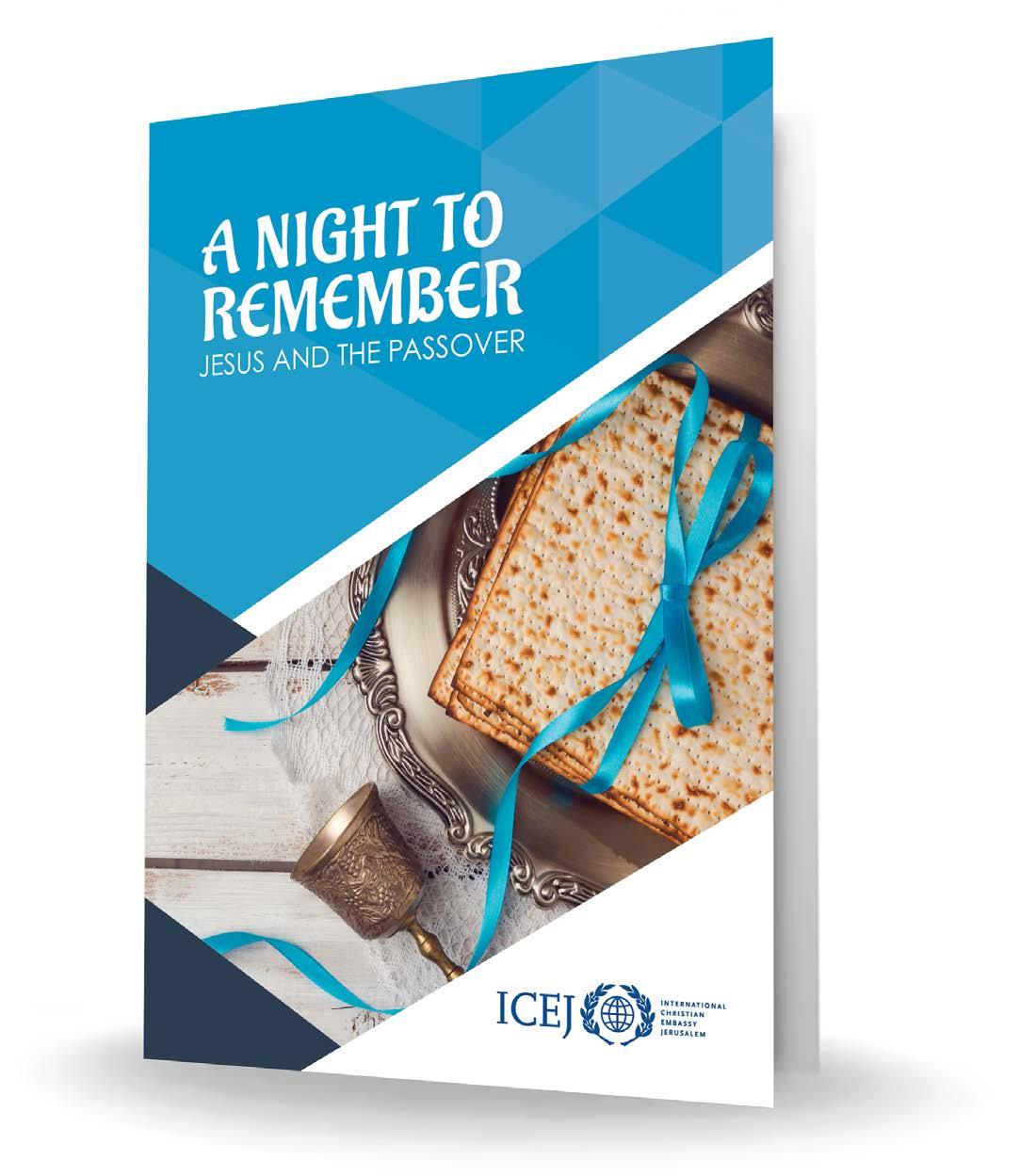

H OST A PASSOVER SEDER for your family, church, or Bible study group this year! Learn more at www.icejusa.org/seder or call our office to find an ICEJ seder near you at: 615-895-9830. Celebrating Passover brings a deeper understanding of the exodus and its significance for Christians today. The ICEJ team can lead your group through all parts of the meal or assist you in hosting your own using our beautiful, new ICEJ Passover seder booklet that will walk you through every step.

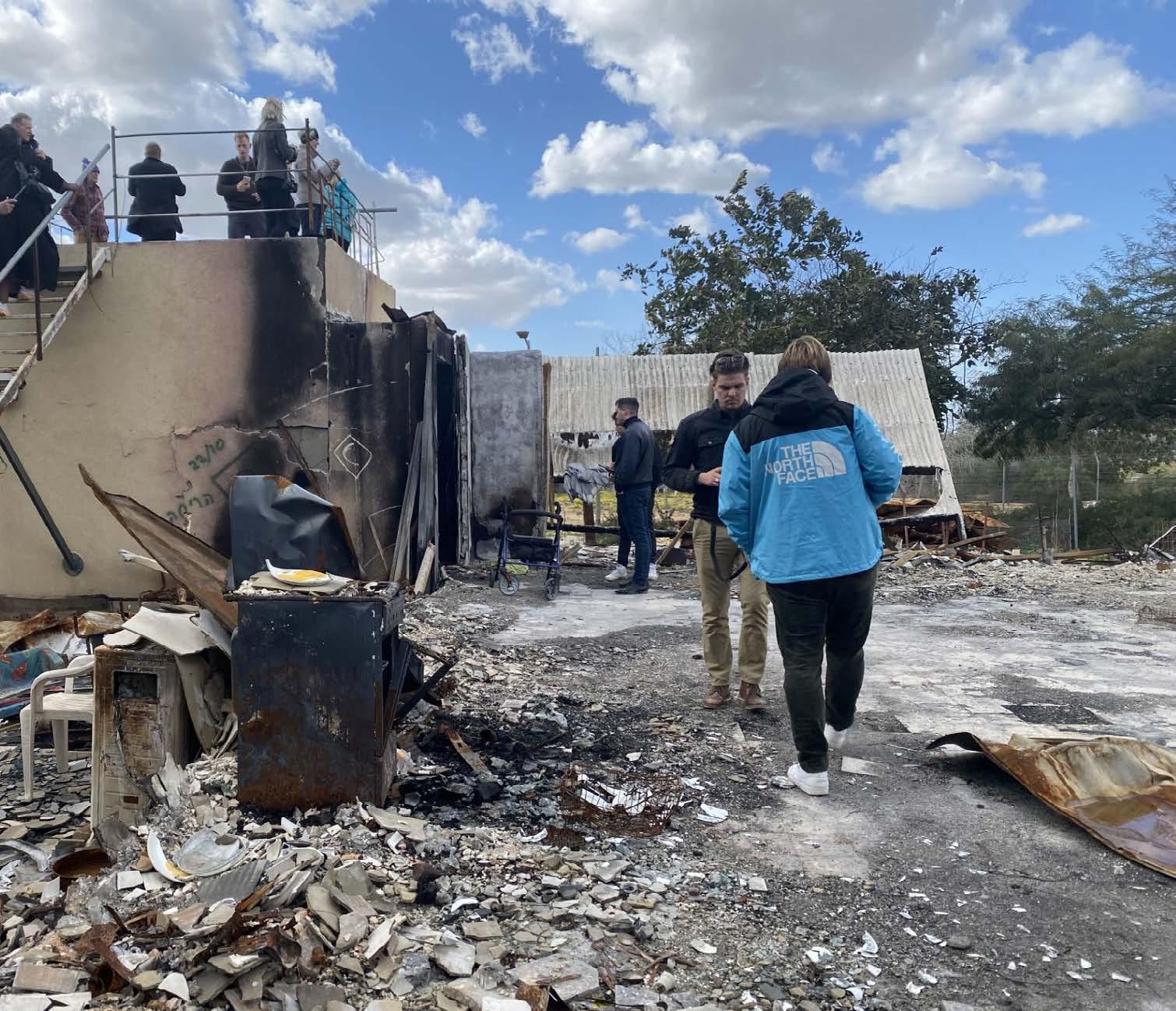
WHEN WORDS AREN’T ENOUGH
Envision Pastors and Leaders Conference and Solidarity Tour
JOHN VEDDER, ICEJ USA CHURCH RELATIONS COORDINATOR
The USA Branch of the ICEJ sent 13 pastors and leaders to Israel to attend the Envision Conference and Solidarity Tour from January 29–February 1. The purpose of this trip was to stand in support of the nation of Israel in this unprecedented time and to see firsthand the atrocities of October 7. While it is true that pictures are worth a thousand words, they are incapable of transmitting the complete story and weight of certain situations. This tour was one of those times. We had to see for ourselves. But it was also important time to simply show up for our friends in Israel.
On Tuesday, January 30, on our first full day of travel, we went to Southern Israel, close to the Gazan border, to visit communities attacked on October 7. We stood face to face with 1,200 blown up, burnt out, and brutally attacked vehicles from that dark day. The cars we saw were just a portion of the 3,500 destroyed throughout the horrific events of October 7, stacked in just one of three fields just like it. It’s impossible to describe the heaviness we felt as we contemplated the horrors that had taken place.
We then visited the community of Kibbutz Nir Oz. We walked through homes that had also been blown up and burnt to the ground. Bullet
holes were still visible around door handles that Hamas terrorists, who blasted their way into the homes of innocent families, left behind. We listened to the firsthand account of a resident who survived the attack, who told us the name of each family living in those homes on October 7. Out of around 400 residents, over 120 were either murdered or taken hostage. What was once a thriving community was now ashes and rubble.
Our final stop for the day was a barbecue lunch for another community nearby, where we served a group of IDF soldiers. It was our opportunity to eat with them and let them know we have been praying for them and are standing with them back in each of our countries.
T he following day, we received world-class teachings and visited the Knesset, where we heard briefings from top Israeli leaders. We listened to one mother tell of the last time she and her husband saw their son before Hamas kidnapped him. He was one of the young adults at the Nova festival.
On the final day, we drove to northern Israel, close to the border with Lebanon, to visit two bomb shelters that the ICEJ refurbished. These bomb shelters are quite literally saving lives
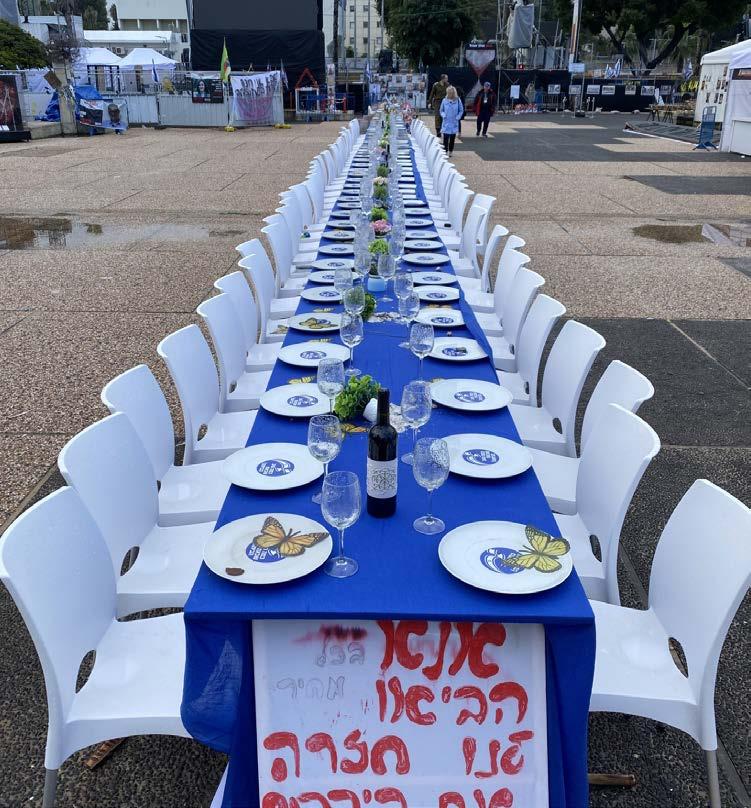
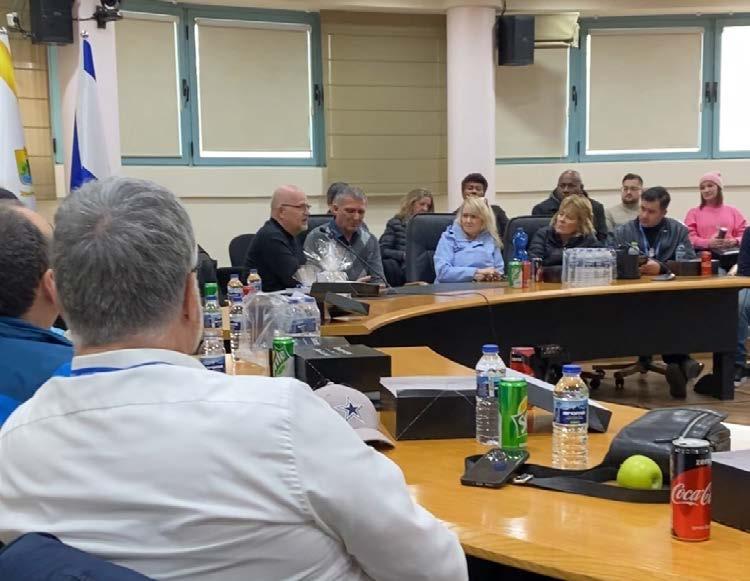
as Hezbollah rains rockets down on this area.
It is difficult to put into words the emotions and heaviness of our experience in Israel. What I can say is that every Israeli we spoke to thanked us for coming. In a situation like this, when we have few words of comfort to offer, we must simply show up—we must be present. A hug and a handshake are physical actions that say, “We love you and are praying for you.”
T he images and memories of these four short days in Israel will live forever in my mind. October 7 was one of the darkest days in the history of Israel. While many Israelis might not call themselves religious or believers in God, many are lifting their voices to the God of their ancestors—the God of Abraham, Isaac, and Jacob. They are asking for His protection over their soldiers and pleading that He would intervene to let their people go.
I believe God is using this tragedy to draw His people into a relationship with Him. Let us join them in prayer. Let us join them in showing love. And let us join them in practical support of solidarity as they go through the most difficult days since the rebirth of their nation in 1948.
Now is the time. I cannot be silent—and I pray you will not be either.
12 | MARCH 2024
ICEJ USA REPORT
Square
Hostage
Top left, the aftermath at Kibbutz Nir Oz; top right, empty Shabbat table at Hostage Square, Tel Aviv; bottom right, briefing in northern Israel
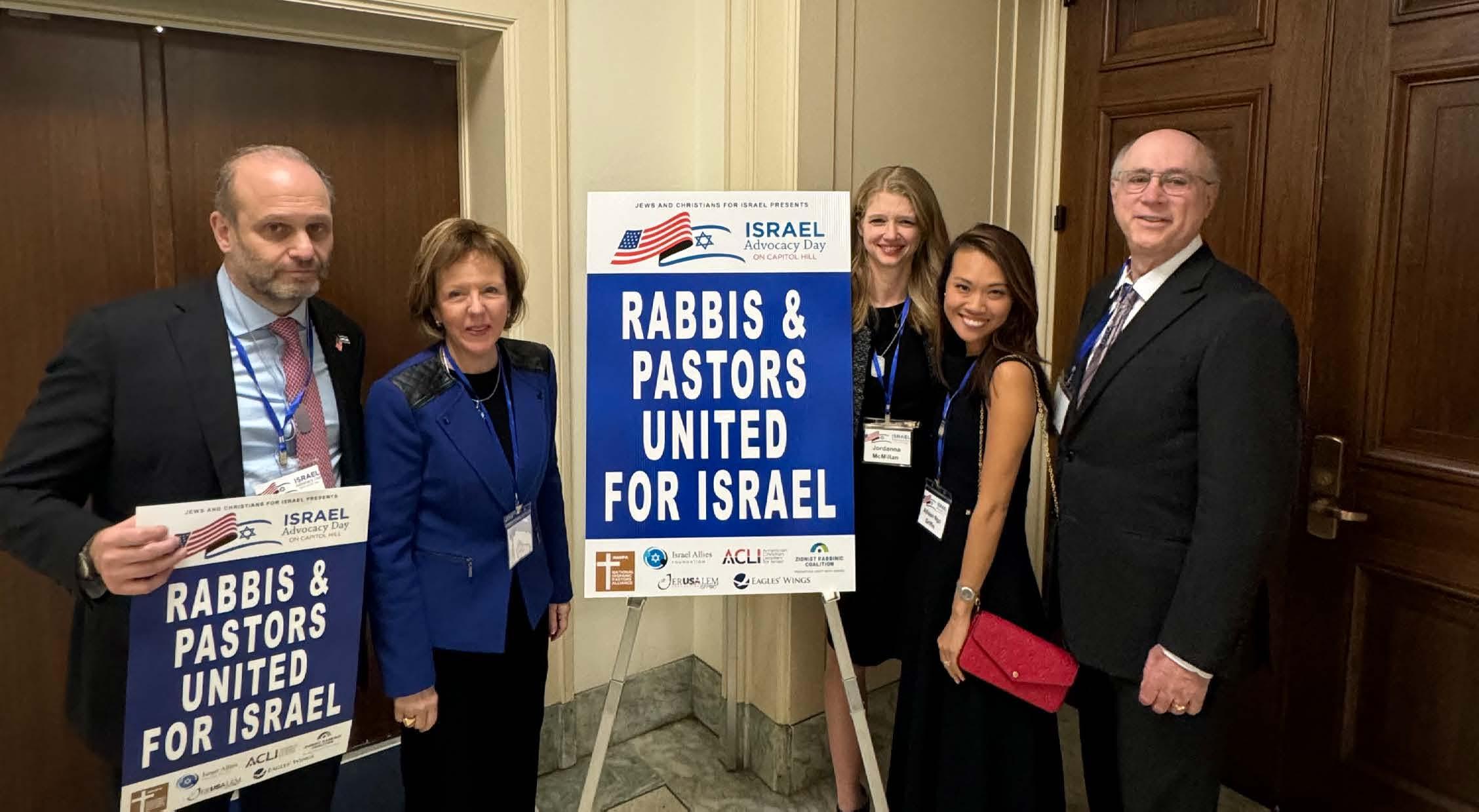
PASTORS, RABBIS, AND LEADERS UNITE TO STAND FOR ISRAEL
SHANNON BENNETT, ICEJ USA LEADERSHIP OUTREACH COORDINATOR
On January 31, 2024, the ICEJ USA Branch helped organize a special advocacy day on Capitol Hill involving more than 70 Christian pastors and Orthodox Jewish rabbis, marking the first time such a pro-Israel initiative by an interfaith delegation of clergymen was ever undertaken in the US Congress. The joint mission was held in cooperation with American Christian Leaders for Israel, Israel Allies Foundation, Zionist Rabbinic Coalition, Eagles’ Wings, the Jerusalem Connection Report, and the National Hispanic Pastors Alliance, and aimed to take a strong interfaith stand for Israel in Washington DC during the IDF’s battle against Hamas terrorism in Gaza.
“We were so overwhelmed by the warmth and unity we felt as we walked the halls of Congress with our Jewish counterparts. This is a gamechanging moment in the history of JewishChristian relations, and we’re so excited about all the good that can come about as we continue
to work together,” stated ICEJ USA National Director Dr. Susan Michael.
ICEJ USA Prayer Coordinator Julaine Stark noted that the special “Israel Advocacy Day” saw over 70 Christian pastors and Jewish rabbis from 15 states coalesce as one to advocate for Israel in meetings with 30 Members of Congress, expressing support for Israel and the urgent need to free the Israeli hostages still held by Hamas in Gaza.
“This joint mission of Jewish and Christian leaders is coming at a critical time as Israel’s war to eliminate Hamas—a threat to the entire freedom-loving world—continues,” US Israel Allies Foundation Director Jordanna McMillan told the Jewish News Syndicate (JNS) on the day of the event. “We have all watched the disruptive, and at times violent, protests against Israel and attacks on Jews worldwide, and this faith-based advocacy effort reaffirms to our nation’s political leaders the breadth and depth
of American support for Israel.”
“Supporting Israel in her war with Hamas is an American issue and an issue for all people of goodwill. Never before have rabbis and pastors gone to Congress to lobby together,” New York Rabbi Chaim Steinmetz also told JNS. “It is happening today, as Americans are increasingly concerned that Iran and her proxies are threatening the very existence of a key American ally.”
T he ICEJ has committed to a three-pronged response to the war in Gaza, through prayer, relief aid, and solidarity with Israel. Please do your part to pray, stand with Israel, and give toward the many needs arising from this crisis.
13 |WORD FROM JERUSALEM
Rabbi Haim Steinmetz of Kehilat Jeshuran; Dr. Susan Michael of ICEJ USA and ACLI; Jordanna McMillan of Israel Allies Foundation; Allison Griffin of ICEJ USA; and Rabbi Stuart Weinblatt of Zionist Rabbinical Coalition at the 2024 Israel Advocacy Day on Capital Hill
Give today at: www.icejusa.org/crisis ICEJ USA REPORT

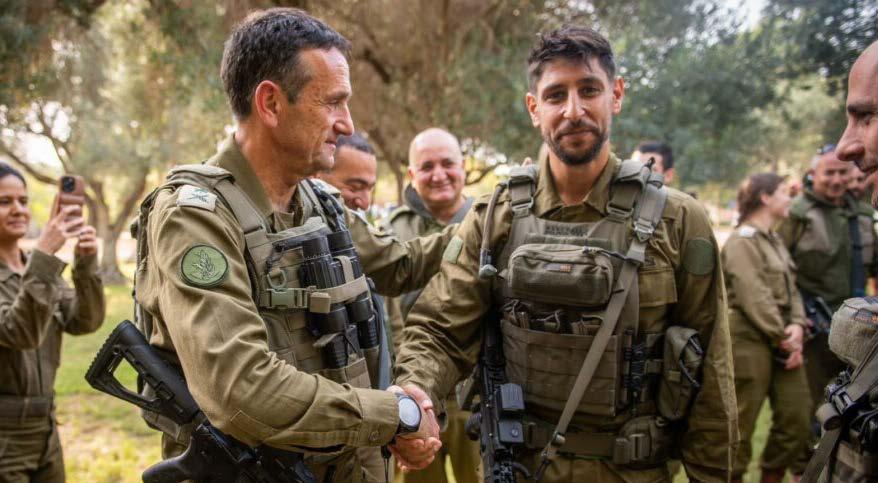
TA LAND NOT FORSAKEN
DAVID R. PARSONS, ICEJ VICE PRESIDENT & SENIOR SPOKESMAN
You shall no longer be termed Forsaken, nor shall your land any more be termed Desolate; but you shall be called Hephzibah, and your land Beulah; for the Lord delights in you, and your land shall be married. For as a young man marries a virgin, so shall your sons marry you; and as the bridegroom rejoices over the bride, so shall your God rejoice over you. (Isaiah 62:4–5)
he news out of Israel these days is filled with negative stories about the IDF’s painful, protracted fight against Hamas in Gaza. There is overall progress being made, but most headlines tell of more dead Israeli soldiers, hostages still suffering in dark tunnels, rising dissent inside Israel, and even greater threats looming on other fronts.
In such times of crisis, we long for any positive news about Israel—and there is positive news! Though this war with Hamas has triggered waves of antisemitism worldwide, it also is generating a surge of interest in Aliyah. Reports indicate that Jewish applications to immigrate to Israel have risen sharply in some countries, including by 500 percent in France.
It also was encouraging to see the swift return of tens of thousands of Israelis living abroad when war erupted last October. Inbound flights were packed as Israeli airlines added extra seats to fit everyone on board. Many returnees were IDF reservists, including some who had not been called for duty but reported anyway.
T hat, indeed, was another positive sign. When the IDF called up 300,000 reserve soldiers, over 360,000 showed up to fight. It is unheard of for any army to see a 120 percent rate of reporting among reservists. They knew the seriousness of the battle ahead but came anyway.
One IDF reservist who reported for duty was Idan Amedi (picture above). Born into a family of Kurdish Jews, he won a song contest on Israeli TV back in 2010 and soon recorded five studio albums. Idan then joined the cast of Fauda, a successful TV drama on the gritty struggle between Israeli security and Palestinian terrorists. Netflix even picked up the series and has a huge following in the Arab world.
Despite being a star singer and actor, Idan answered the call to serve in Gaza with his combat engineering unit. But in January, he was
seriously wounded in a tragic incident while helping prepare a Hamas tunnel for demolition. Idan is now recuperating.
Given his fame, he probably could have skirted off to Hollywood and avoided this vicious war. Yet he represents a whole army of young doctors and lawyers and hi-tech innovators who have left behind successful businesses and lucrative careers to fight in the cramped alleyways and tunnels of Gaza. Many IDF reservists also left behind wives and children, but they know they are fighting for their homes and the very existence of Israel.
T his all bodes well for Israel. Another wave of Jews around the world are preparing to come home to Israel, even though they have safer options elsewhere. We should salute every Jew who chooses to come live in this land of conflict, as well as those who refuse to leave but stay to defend their ancestral homeland. God surely “delights” in these acts of faith and courage by His people.
Isaiah 62 inspires us to be vigilant watchmen on the walls of Jerusalem and pray for the city to shine forth and become “a praise in the earth”—and for the children of Israel to become deeply attached to their ancestral homeland.
God once asked the Jewish people to forsake all other gods and serve Him alone. Today, He is asking them to forsake all other lands and “marry” themselves to the Land of Israel, even by putting their lives on the line for its sake. Thankfully, many are answering that call. In fact, the most popular battle song in this war is the Hebrew tune “Am Yisrael Chai,” the lyrics of which proclaim: “We have no other land.”
T here is a lesson here for Christians as well: to wed ourselves to God’s prophetic purposes over Israel and over our own lives in these challenging days.
14 | MARCH 2024
CURRENT EVENTS

OKEEPING HOLOCAUST SURVIVORS’ STORIES ALIVE
YUDIT SETZ, ICEJ DEPUTY AID DIRECTOR
n January 25, the Haifa Home for Holocaust Survivors marked International Holocaust Memorial Day in the presence of consuls and ambassadors from many nations who arrived to show their support for the Jewish people. We were all moved by Mania, a Haifa Home resident and Holocaust Survivor who shared her powerful story of hope in the face of such adversity.
In Israel today, there are 137,401 Holocaust Survivors and victims of antisemitic harassment during the Holocaust who are still alive and living in the Land. Their ages range from 77 to 111 years old, and 62 percent are women.
With the level of antisemitism now reaching the same level as it was in the 1930s, Survivors are determined to raise their voices to ensure their stories and the stories of their families and people are not forgotten.
It was a sobering moment at the Memorial Day event when Mania reflected on how, after October 7, somehow the words “Never Again” seemed to have lost their meaning. It made us understand the importance of supporting these Survivors in this dark hour.
Renovation of the Dining Hall
We are also excited to now be renovating the Haifa Home dining hall. After years of wear and tear with broken ceilings, chipped
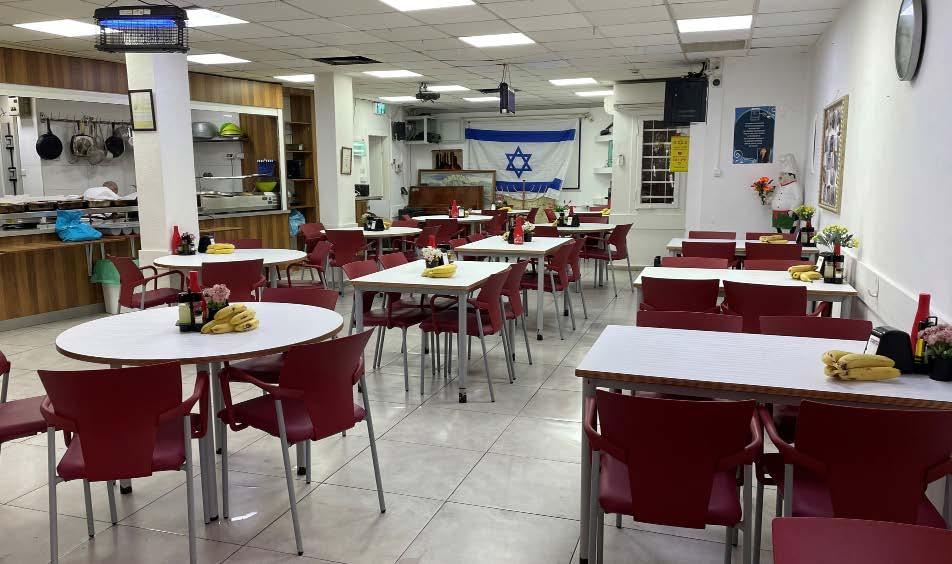
paint, and exposed wiring, with your support, we have been able to start renovations.
T hrough connections in the area, we have hired Maya—a recent Russian immigrant with a degree in engineering and experience in interior design—to lead the renovation in the Home as her first project in Israel!
Our goal is to create a welcoming, uplifting, and inspiring environment. We are rewiring, painting walls, and have fixed the ceiling. Stay tuned for our grand opening ceremony!
Update on the Fitness Room
Haifa Home residents are overjoyed with their new fitness and physiotherapy room. Simcha, our physiotherapist, refers to this room as the “Fitness Garden,” and that is exactly what it is.
Walking into the room, the bright colors and many plants instantly spark joy and excitement. The new, beautiful space houses some of the best equipment, specifically chosen according to the residents’ needs. A massage bed, elliptical machine, and strength training equipment are just some of the tools Simcha uses to support the Survivors. Simcha also uses games and therapeutic dolls to engage them.
Creative Therapy
Since the war began on October 7, the nation as a whole has experienced trauma, heightened stress, and depression. In response, and to support the residents of the Haifa Home, a local art therapist is providing regular creative therapy sessions. We have already witnessed symptoms of depression and anxiety alleviated through this program.
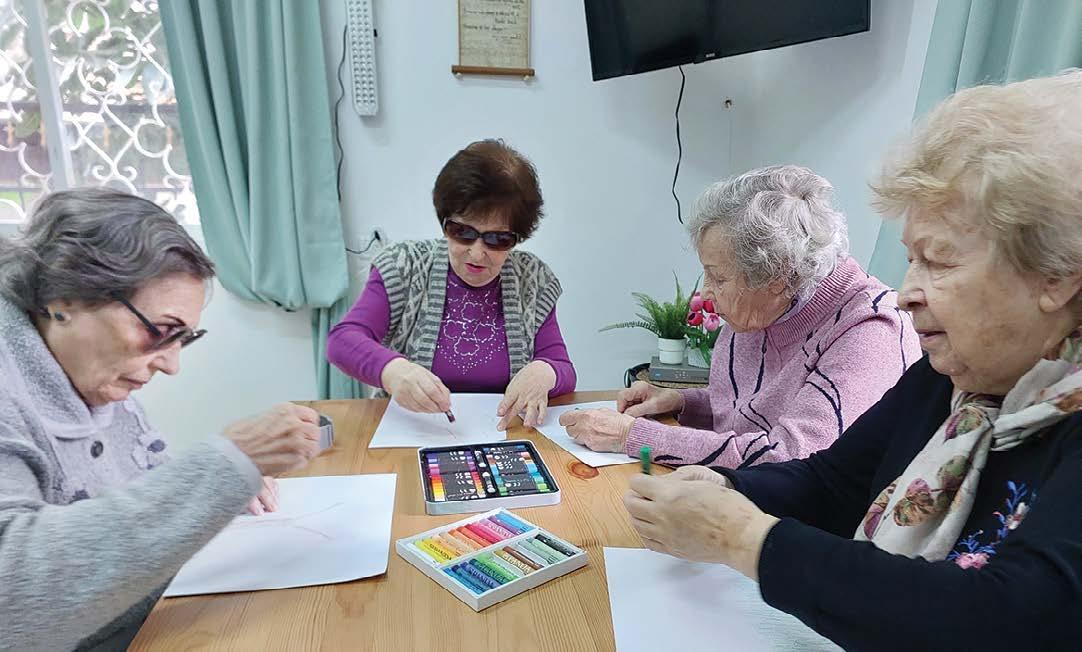
In January we focused on Tu B’shvat (the new year of trees) activities. One of the activities was painting almond trees, which are the first trees to grow in Israel during this season.
T his activity helped to focus Survivors on the gift of life and the beauty in it; it helped them redirect their attention from the tragedies Israel is facing and the loss of life they have witnessed to the beauty of creation and new life. When ICEJ staff complimented a resident from Ukraine named Arnold, he said with a big smile, “Don’t give me too much praise, or else I will become prideful!”
Make a difference in the life of a Holocaust Survivor by supporting the Haifa Home. Donate today at: www.icejusa.org/donate-haifa-home/
15 |WORD FROM JERUSALEM
ICEJ HAIFA HOME FOR HOLOCAUST SURVIVORS

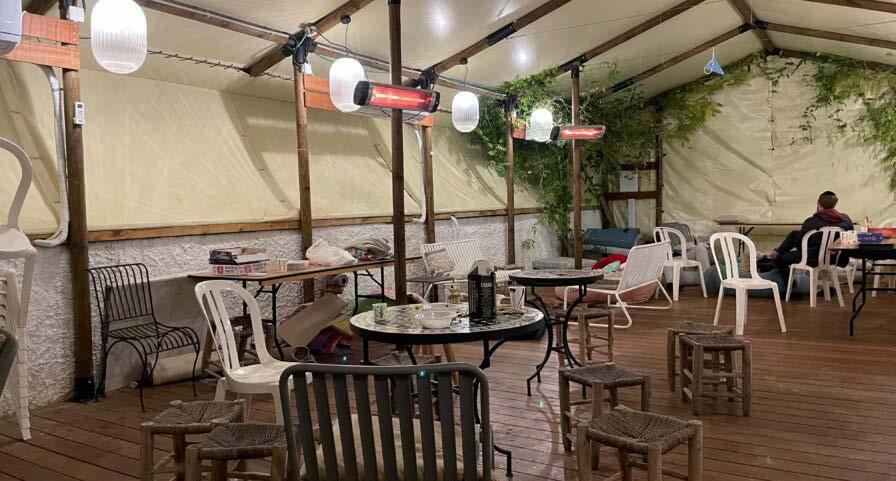
ICEJ PROVIDES A REFUGE FOR YOUTH AMID CHALLENGING TIMES
ICEJ AID ADMINISTRATOR NATIVIA SAMUELSEN
For many families in Israel, the scars from the terror of the October 7 massacre are still raw. Most Israeli families displaced from their homes and living in hotels share cramped quarters in one or two rooms with little space for privacy, and this has dramatically impacted young people struggling with uncertainty. Their sense of security has been shattered and their education severely disrupted.
In response to the more than 12,000 evacuated youths considered “at-risk” who urgently require emotional support, the ICEJ jumped in to provide a place for them to gather with others their same age: a pop-up tent in Maale HaChamisha, a community offering a haven of safety in this uncertain time.
T here these youths can retreat to their own space with friends and enjoy evening meals, fun group activities, and on-site counseling. This set-apart site gives them the space to be a teenager.
Laughter-filled chatter fills the tent each day, and the comforting aroma of a freshly cooked meal makes the space feel like a home. But beyond these joy-filled sounds and scenes, these young ones bear heavy burdens, wearing smiles over chipped hearts.
Nati, the social worker, told us, “Every day they live on the same hotel food in the same cramped rooms with no privacy, having no set routine, all while facing absence from school and having friends and family scattered to other places. Not only this, but many lost loved ones in the October 7 attack or in the fighting. The toll this situation is taking on their mental health is both real and significant, leading to problematic behaviors like vandalism, drinking, and in some cases, even drug use.
“We need to work on setting boundaries, as youth are given a lot of freedom and no curfews. Efforts are being made to provide trauma counseling and entertain the evacuees through various activities.
“The situation is shifting now as families slowly begin to relocate, often without knowing if this is a more permanent goodbye or if they will reconnect with the community later. Sometimes the teenagers may be allowed to stay in the hotel with friends, or they may need to say a quick goodbye to friends who are an important support network in difficult times with little advance notice.”
It's apparent from a quick look around the tent that these teens need a safe space where they can connect and share heart to heart with each other. Everything they trusted in has been shaken, and processing the unprecedented and difficult circumstances is taking its toll. The cozy and familiar tent has given them a place to breathe, process, and start feeling secure in themselves again.
T he ICEJ is privileged to support the 50 to 80 youth from southern Israel who come each day to this oasis we have provided. Backed by trained staff, this grassroots initiative gives hope to youth who have been wounded by the atrocities they have seen and heard. Through this, we hope to restore their well-being and mental health while building up these Gen Z Israelis into champions of resilience and strength.
T hank you for supporting our Israel in Crisis fund. Your generosity allows us to make a significant difference in the lives of Israelis of all ages who have been forced to leave their homes due to the October 7 terrorist attacks. We are committed to providing them with the necessary care and support during this difficult time.
16 | MARCH 2024 Give to the Israel in Crisis fund at: www.icejusa.org/crisis
ICEJ AID
ICEJ POISED TO ASSIST WAVE OF JEWISH IMMIGRATION TO ISRAEL
HOWARD FLOWER, ICEJ ALIYAH DIRECTOR
When I have brought them back from the peoples and gathered them out of their enemies’ lands, and I am hallowed in them in the sight of many nations, then they shall know that I am the Lord their God, who sent them into captivity among the nations, but also brought them back to their land. (Ezekiel 39:27)
Since Hamas’ attack on Israel on October 7, global antisemitism has significantly increased in countries like the United States, France, and South Africa. As a result, the numbers of Jewish people starting the immigration process has also increased—leading to the Jewish Agency for Israel’s request for the ICEJ to assist in sponsoring flights for Jewish immigrants coming from those countries.
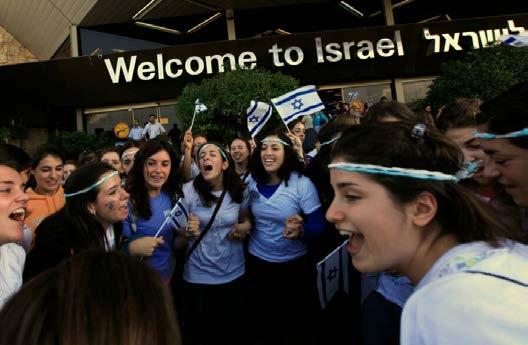
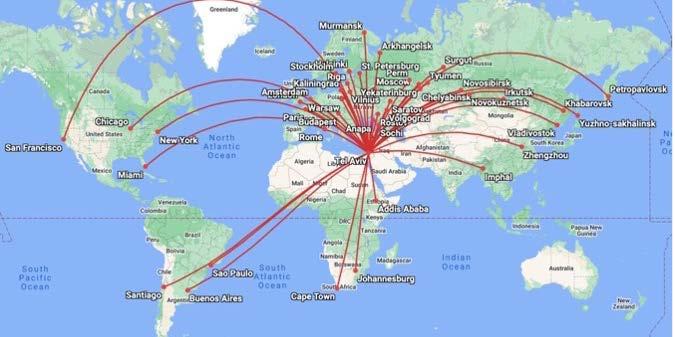
Antisemitism in America
The Anti-Defamation League (ADL), which tracks antisemitism, reported 3,283 antisemitic incidents between October 7 and January 7 in America alone. These incidents included 60 physical assaults, 553 instances of vandalism, and a substantial number of verbal or written harassment cases. College campuses experienced 505 incidents, and there were 246 incidents in K-12 schools. Jewish institutions like synagogues and community centers also reported numerous cases.
These incidents have raised serious concerns about the safety and well-being of the Jewish community in the United States. The ADL has emphasized the unprecedented level of threat facing the American Jewish community and highlighted the need for vigilance and response to these acts of hate. But it has also turned many American Jews’ focus toward immigrating to Israel.
The Israeli newspaper Israel Hayom recently reported on this rise in US antisemitism and how it is reflected in the 4,200 new Aliyah files opened with Nefesh B’Nefesh—a US-based nonprofit organization that promotes and facilitates Jewish immigration to Israel. This is an increase of 120 percent over the same period last year.
Antisemitism in France
There has been a 1,000 percent increase in the number of antisemitic incidents in France according to an article in Israel Hayom. In a country in which the Jewish community is much smaller than the American
Jewish population, more than 1,800 antisemitic incidents were reported in 2023, and in early February of this year, Israel Hayom published that since October 7, there has been a 1,000 percent increase in the number of antisemitic incidents. This has led to a 500 percent increase in the number of applicants for Aliyah from France, according to Israel’s Ministry of Aliyah and Integration. The French Interior Minister Gérald Darmanin reported more than 1,500 antisemitic acts in the country from October 7 to January 7. This surge in antisemitic behavior has led to almost 500 arrests, including 102 foreigners apprehended for related offences—and like in America, is reflected in Jewish people wanting to make Aliyah.
Antisemitism in South Africa
In South Africa, which has an even smaller Jewish community, antisemitic incidents have also shown a significant increase since the Hamas-led attack on Israel last October. According to the South African Jewish Board of Deputies (SAJBD), 180 antisemitic incidents were recorded in the country from the start of 2023 to the date of the report, with 110 of these occurring after October 7. This marked a considerable rise compared to the previous year.
These incidents have not only been a source of concern for the Jewish community in South Africa but have also been linked to the broader political and social context within the country. The government’s delay in condemning the October 7 attacks by Hamas and its interactions with groups like Hamas and Fatah have raised concerns about the impact on antisemitic rhetoric and behavior within the country.
The ICEJ has been asked to help with flights—most urgently for Jewish people preparing to make Aliyah from France—but also South African, US, and Russian flights. God is gathering His people from the nations to the Land of Israel, just as He promised, and the ICEJ is poised to support the expected tsunami of Jewish immigrants ready to escape growing global antisemitism and come home.

Please join your hearts with ours in supporting this enormous need for Aliyah assistance. Give your best gift today at: www.icejusa.org/aliyah 17 |WORD FROM JERUSALEM
Pro-Palestinian supporters in Cape Town, South Africa
ICEJ-assisted flight patterns
ICEJ ALIYAH AND ABSORPTION

Your Israel Answer
The Double-Standards of the Gaza War
By Dr. Susan Michael, ICEJ USA Director
The world’s response to Israel’s war with Hamas that began on October 7 is nothing short of a travesty. Not only has Israel had to defend its defensive war against those who carried out the barbaric attack against Israeli civilians and threatened to repeat it, but it has faced a wave of double standards. The last few issues of Word From Jerusalem featured a series of articles on false and antisemitic accusations against Israel; I will now discuss the deafening silence from many people and organizations toward more egregious situations—a silence that reveals the antisemitism behind their focus on Israel.
Silence of women’s organizations regarding the sexual assault of Israeli women
It’s no secret that the atrocities of October 7 involved systematic acts of sexual brutality against women—acts too inhumane to print here. The typically vocal women’s rights groups we would expect to respond have been slow to condemn Hamas rapes. They have been peculiarly quiet, and have even questioned the integrity of the accusations—this despite the ample proof found in photographs, eyewitness testimony, and reports from doctors. What happened to believing women and the #metoo movement? For these groups to remain silent makes them complicit. In response, some Jewish women started the hashtag #metoounlessyoureajew.
Even the United Nations Entity for Gender Equality and the Empowerment of Women took eight weeks to issue a statement and call for an investigation. The UN and other organizations are finally saying something, but it shouldn’t have taken so long to admit reality. Likely, these organizations are disinclined to make a statement because many align with leftist movements that oppose Israeli policies toward the Palestinians. However, rape as an act of war should be condemned regardless of political affiliation.
Silence of the anti-Israel progressives on all other wars in the world
There is no doubt the war in Gaza has been devastating to the people who live there and have been uprooted from their homes, not to mention the loss of Gazan lives. Yet anti-Israel progressives have focused their attention on pushing false narratives about Israel as an evil colonist oppressor bent on wiping out the Gazan people while they remain quiet on other wars, like the Russian War on Ukraine and civil wars in Syria, Afghanistan, Yemen, and Ethiopia. There are some 110 armed conflicts around the world, and some 45 of them are
in the Middle East—yet all the attention is on the war in Gaza.
Silence of the World Court (ICJ) on other genocides in Sudan and other countries
In January 2024, South Africa took Israel before the International Court of Justice (ICJ), alleging Israel violated the 1948 Genocide Convention with its military acts in Gaza. Yet the ICJ disregards Hamas’ genocidal jihadist agenda, spelled out in its founding charter as a sacred Islamic duty to eradicate the Jews in Israel and around the world. In the time since the Genocide Convention was enacted, there have been several clear acts of genocide worldwide, such as the Hutu tribe’s mass slaughter of Tutsis in Rwanda, identity-based killings of civilians in Ethiopia, and the Khartoum regime’s massacre of non-Arabs in the Darfur region of Sudan that continues today. In Congo, an ongoing genocide has taken the lives of more than 5 million people. Yet of those genocides, the ICJ remains quiet.
Silence of the UN about the Egyptian refusal to let the Gazan people out of Gaza
The most common reasons refugees leave their home country in hopes of finding a better life are armed conflicts and wars. The ongoing Syrian civil war, for example, produced 5 million refugees who have, for the most part, remained in other Middle Eastern countries like Turkey, Lebanon, and Jordan. More than 3 million Ukrainians applied for temporary residence in countries such as Poland and Germany in just a few months after the start of the Russia-Ukraine war. America’s invasion of Iraq generated 2 million international refugees.
However, when Israel’s war with Hamas started, the Egyptian government almost immediately ruled out any possibility of accepting Palestinian refugees and continues to refuse to open that border—even temporarily, to ease the humanitarian crisis. The US administration hasn’t pressured Egypt to open its border to Gazan refugees seeking asylum in Western countries. Neither has the United Nations—even though fleeing a war zone and seeking asylum in a neutral country is a human right enshrined in the 1951 United Nations Refugee Convention. Why the silence?
Egypt’s refusal to accept Palestinian refugees is likely deliberate, the result of US-supported policies that serve the political interests of Arab nations. Keeping refugees imprisoned in Gaza allows those Arab countries to then blame Israel for any unfolding humanitarian crisis.
18 | SEPTEMBER/OCTOBER 2020
18 |OCTOBER 2023
Get your questions about Israel answered at: www.israelanswers.com


‘‘Not by might nor by power, but by My Spirit,’’ Says the Lord of hosts.
Zechariah
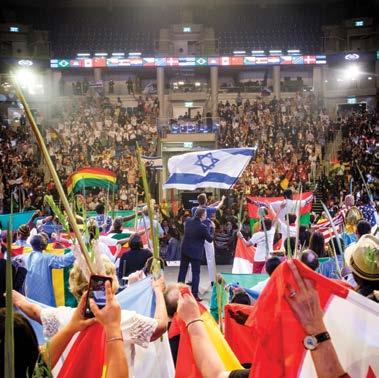
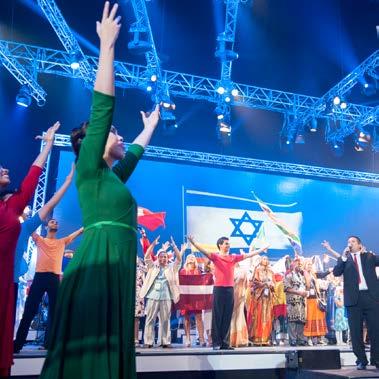
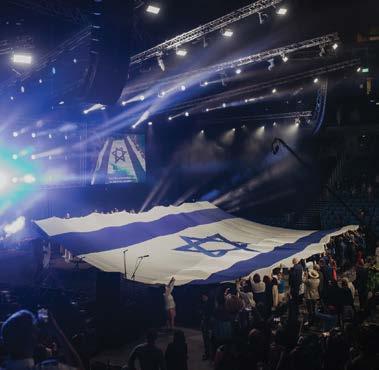

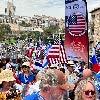
For more information visit feast.icej.org or email events@icej.org
SAVE
4:6 16-23 october 2024
THE DATE












































